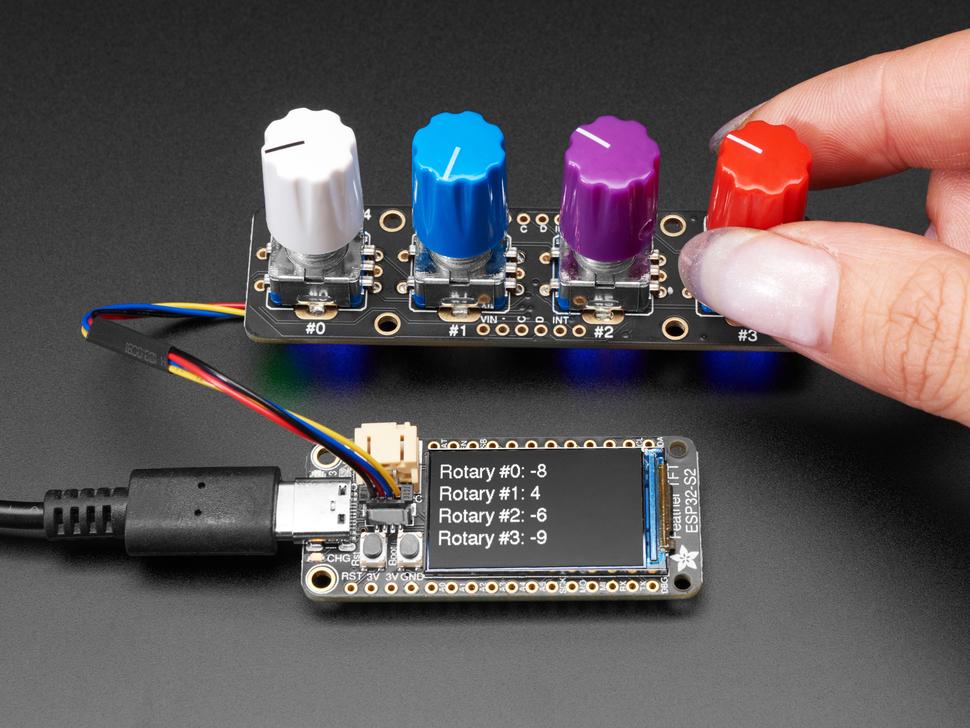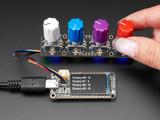Adafruit I2C Quad Rotary Encoder Breakout with NeoPixel

Description
Rotary encoders offer precise control with 360-degree rotation, unlike traditional potentiometers. These innovative encoders feature tactile detents, providing satisfying feedback with every twist.
For seamless integration, this Stemma QT breakout board simplifies the process. With compatibility for up to four rotary encoders, it's perfect for creating extensive, knob-filled interfaces.
Designed for easy setup, solder any standard PEC11-pinout encoders, with or without a push-switch. The onboard microcontroller, programmed with seesaw firmware, tracks pulses and pins, saving incremental values for I2C querying.
Integration is effortless; connect using a Stemma QT cable with microcontrollers ranging from Arduino UNO to Raspberry Pi. Control and data reading are streamlined using our Arduino library, with additional support via CircuitPython/Python for Linux-based systems.
Featuring reverse-mount NeoPixels for visual feedback with translucent shaft encoders, these LEDs are controlled over I2C. The INT pin provides low pulses upon rotation or button press detection, reducing the need for constant I2C reads.
Flexibility is key, allowing up to eight encoder connections on a single I2C port through adjustable address jumpers. With connectors compatible with SparkFun Qwiic I2C, solderless connections and wide-ranging sensor chaining are supported using compatible cables.
This breakout board offers full customization, allowing for detent and detentless encoders. Note that high-speed motor encoders are not supported; it's designed for hand-rotated mechanical encoders only.
Enhance your projects with this versatile and intuitive rotary encoder breakout, providing accessible, dynamic control capabilities.
Properties
| Brand | Adafruit |
| Model | 5752 |
Delivered in 10 to 30 days
Customer questions
Customer Reviews
- In stock Adafruit White LED Backlight Module - Medium 23mm x 75mm € 3,25 View product
- In stock Adafruit Waterproof DC Power Cable Set - 5.5/2.1mm € 3,25 View product
- In stock Adafruit Breadboard-friendly SPDT Slide Switch € 1,25 View product
- In stock Adafruit Small Enclosed Piezo w/Wires € 1,25 View product
- In stock Adafruit Mini Metal Speaker w/ Wires - 8 ohm 0.5W € 2,50 View product
- In stock Adafruit JST PH 2-Pin Cable – Male Header 200mm € 1,- View product
- In stock Adafruit Small Alligator Clip to Male Jumper Wire Bundle - 6 Pieces € 6,40 View product
- In stock Adafruit NOOds - Flexible LED Filament - 3V 300mm long - Lime Green € 8,75 View product
- In stock Adafruit NOOds - Flexible LED Filament - 3V 300mm long - Warm White € 5,75 View product
- In stock Adafruit Woven Conductive Fabric - 20cm square € 6,25 View product
- In stock Adafruit Single ended nOOds - 128mm long Flexible LED Filament - Blue 3V € 5,- View product
- In stock Adafruit Micro Lipo - USB LiIon/LiPoly charger € 7,50 View product
- 5 pieces In stock Adafruit NeoPixel Diffused 5mm Through-Hole LED - 5 Pack € 6,25 View product
- In stock Adafruit Stereo Enclosed Speaker Set - 3W 4 Ohm € 9,25 View product
- In stock Adafruit bq25185 USB / DC / Solar Charger with 3.3V Buck Board € 11,25 View product
Recently viewed items
- Adafruit I2C Quad Rotary Encoder Breakout with NeoPixel € 9,25 View product
- Adafruit 20x2 Character VFD (Vacuum Fluorescent Display) - SPI interface € 37,- View product
- Adafruit Round Solar Panel Skill Badge - 5V / 40mA € 3,75 View product
- Adafruit USB WiFi (802.11b/g/n) Module with Antenna for Raspberry Pi € 24,50 View product
- Adafruit Hummingbird Duo Premium Robotics Kit € 337,75 View product
- Adafruit DIY HDMI Cable Parts - Straight Mini HDMI Socket Adapter € 8,- View product
- Adafruit Panel-Mount Banana Jacks 4mm - Pack of 5 Multi-Color € 7,50 View product
- Adafruit ABS Filament for 3D Printers - 3mm Diameter - Silver - 1KG € 56,75 View product
- Adafruit Bluefruit LE Micro - Bluetooth Low Energy + ATmega32u4 € 33,25 View product
- Adafruit Pre-Cut Multi-Colored Heat Shrink Pack Kit - 280 pcs € 12,50 View product
- Adafruit Ad Blocking Kit for Pi-Hole with 2.8" PiTFT - No Soldering! € 67,75 View product
- Adafruit USB A Jack to Micro USB B Jack Round Panel Mount Adapter € 7,50 View product
- Adafruit Etched Glow-Through Keycap - Zener ESP Plus Design € 6,25 View product
- Adafruit 5V Electromagnet - 2.5 Kg Holding Force € 9,25 View product
- Adafruit Woven USB Cable with USB Type A to Right Angle USB Type C € 5,- View product










